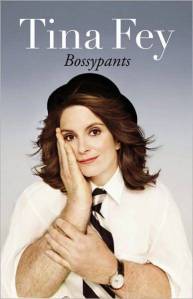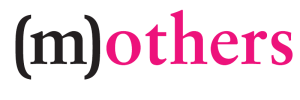To best enjoy Tina Fey’s memoir Bossypants: 1. Have a couple of margaritas. 2. Be a female, 3. aged 40-ish, 4. who’s well-educated and career-minded, 5. with a kid or two. Now, these are general guidelines, and you can slide on one or two of these requirements, but don’t skip the margaritas (that’s just good policy.) It’s not that readers who don’t fit this description won’t enjoy Bossypants. It is funny as hell, and Fey doesn’t skimp on anecdotes from her stints at Second City, Saturday Night Live and 30 Rock. Anyone will respond to those segments. But there is a reflective tone to the memoir which I think adult women in particular will relate to, as Fey examines how her experiences as a young woman and later as a mother shaped (and continue to shape) her ambitions, neuroses and successes.
Fey’s initial stories about her working-class upbringing and time spent in the trenches of the service industry humanize her enough that we’re willing to follow her when she turns her attention to the challenges of celebrity. She relates these stories by paying particular attention to anxieties most women will recognize. For example, I’ve never had to endure a professional photo shoot for a glossy magazine (and that’s really okay with me), but Fey describes the experience with such frankness and humor that anyone who’s ever had her picture taken will feel reassured.
“Somebody will put up a makeshift wall by holding a full-length mirror next to an open loft window, and you will strip down naked. You must not look in that mirror at your doughy legs and flat feet, for today is all about dreams and illusions, and unfiltered natural daylight is the enemy or dreams.
When you inevitably can’t fit into a garment, the stylist’s assistant will be sent in to help you. The stylist’s assistant will be a chic twenty-year-old Asian girl named Esther or Agnes or Lot’s Wife.
…at this point in time her job is to stuff a middle-aged woman’s bare ass crack into a Prada dress and zip it up. In my case, Esther and I are always mutually frustrated when zipping up the tiny dress. Esther is disgusted by my dimply flesh and her low status. I’m annoyed that her tiny hands lack the strength to get Pandora’s plague back into the box.”
Fey never shies from the fact that being a woman has shaped her experiences and successes. She’s up front about her feminism, but she’s not a cookie-cutter feminist. She challenges women to resist victimhood and plunge on with their ambitions, even in the face of sexism. One particularly funny segment of Bossypants details Amy Poehler’s arrival at SNL and exposes the sometimes subtle, unspoken sexism of the entertainment (in particular the comedy) industry:
“Amy (Poehler) was new to SNL and we were all crowded into the seventeenth-floor writers’ room, waiting for the Wednesday read-through to start. There were always a lot of noisy “comedy bits” going on in that room. Amy was in the middle of some such nonsense with Seth Meyers across the table, and she did something vulgar as a joke. I can’t remember what it was exactly, except it was dirty and loud and ‘unladylike’.
Jimmy Fallon, who was arguably the star of the show at the time, turned to her in and in a faux-squeamish voice said, ‘Stop that! It’s not cute! I don’t like it!’ Amy dropped what she was doing, went black in the eyes for a second, and wheeled around on him. ‘I don’t fucking care if you like it.’
…With that exchange, a cosmic shift took place. Amy made it clear that she wasn’t there to be cute. She wasn’t there to play wives and girlfriends in the boys’ scenes. She was there to do what she wanted to do and she did not fucking care if you like it.”
I can’t say I love Fey’s advice to women facing workplace sexism, however:
“So my unsolicited advice to women in the workplace is this. When faced with sexism or ageism or lookism or even really aggressive Buddhism, ask yourself the following question: ‘Is this person in between me and what I want to do?’ If the answer is no, ignore it and move on. Your energy is better used doing your work and outpacing people that way. …
If the answer is yes, you have a more difficult road ahead of you … don’t waste your energy trying to educate or change opinions. Go ‘Over! Under! Through!’ and opinions will change organically when you’re the boss. Or they won’t. Who cares? Do your thing and don’t care if they like it.”
I agree that trusting our own competence is definitely the most valuable response to sexism in the long-run, but sometimes (as Poehler demonstrates) calling others out on their assumptions is valuable and lets people know you’re not showing up just to ferry their coffee.
If you get a chance, I recommend supplementing Bossypants with Rosanne Barr’s recent article in New York Magazine. Both women discuss sexism in the entertainment industry, but Barr’s response is both more strident and more potent. Perhaps Barr’s unwillingness to compromise as a writer, actress and comedian (and ultimately as the boss of her own show) cleared a somewhat smoother path for the Tina Feys, Amy Poehlers and Kristin Wiigs of the next generation.
Fey’s comic timing and original point-of-view are fantastic, and I giggled through most of Bossypants, but long-form prose isn’t exactly her strong suit. Transitions tend to be slight or non-existent, her chapters tend to end abruptly, and her organization is inconsistent. It’s clear Fey spends most of her time writing short sketches and screenplays, as the book’s funniest moments are the lists like “The Mother’s Prayer for Its Daughter,” which includes hopes such as:
“May she play the Drums to the fiery rhythm of her Own Heart with the sinewy strength of her Own Arms, so she need Not Lie With Drummers.”
and
“And when she one day turns on me and calls me a Bitch in front of Hollister,
Give me the strength, Lord, to yank her directly into a cab in front of her friends,
For I will not have that Shit. I will not have it.”
Charmingly, Fey isn’t afraid to expose her own insecurities in the interest of honest reflection, and it’s these insecurities which resonate throughout Bossypants. But I believe the specificity of Fey’s point-of-view prevented even open-minded Mr. Irises from enjoying even the funniest bits I read aloud to him. He’s not a nearly-40-year-old woman writer, terrified of having her picture taken, with a working-class background and young daughter, for example – hence my recommended-reader qualifications. Perhaps I should have plied him with margaritas first? Nah. I think I’ll keep both the margaritas and Bossypants to myself (or share them with my girls.) After all, he has Woody Allen.




You must be logged in to post a comment.